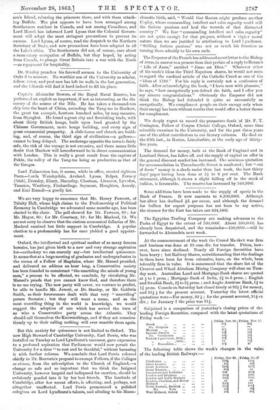But this anxiety for quiescence is not limited to Oxford.
The new High Steward of Cambridge University, Earl Powis, who was installed on Tuesday as Lord Lyndhurst's successor, gave expression to a profound aspiration that Parliament would now permit the University for a time "to rest and be thankful," without harassing it with further reforms. We conclude that Lord POW18 referred chiefly to Mr. Bouveries proposal to exempt Fellows, if the Colleges so choose, from the subscription to the Church of England,—a change so safe and so important that we think the fatigued University, however languid and indisposed for exertion, should be sedulously goaded into it by her bast friends. The lassitude of Cambridge, after her recent efforts, is affecting, and, perhaps, not altogether unaffected. Lord Fowls pronounced a polished eulogium on Lord Lyndhurst's talents, and alluding to his Massa-
chusetts birth, said, "Would that Boston might produce another Copley, whose commanding intellect and calm sagacity could still the furious passions and heal the wounds of that distracted country !" We fear "commanding intellect anl calm sagacity" are not quite enough for that puipose, without a higher moral nature than we are justified in attributing to Lord Lyndhurst. "Stilling furious passions" was not so much his function as turning them adroitly to his own ends.






























 Previous page
Previous page